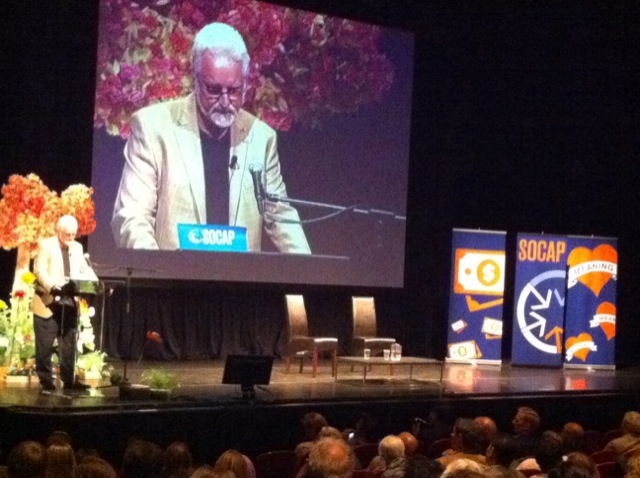
For 2,500 social entrepreneurs, impact investors, and others passionate about the intersection of money and meaning, September’s SOCAP16 was the place to be. SOCAP (Social Capital Markets) is an annual gathering in San Francisco started in 2008 by a small group of investors focused on promoting a double bottom line—social and financial. Its stated mission is to create a platform where investors willing to put money into enterprises focused foremost on social return can meet the world’s most innovative entrepreneurs.
This year’s iteration revealed both the growing popularity of the field and the growing tension between those focused on financial returns and those focused on social returns. In an article published on the SOCAP blog at the start of the gathering, Jed Emerson, a pioneer and one of the most familiar names in the field, reflected on last year’s SOCAP and more broadly on the mainstreaming of impact investing:
It was great, because one could not help but feel we—as an increasingly diverse set of actors promoting a very nontraditional understanding of capital—had arrived!
And it was disillusioning in that it was also clear we are, as a community, still coming to grips with many fundamental questions with regard to who we are, what we believe and how best to be positioned to move forward to capture the possibilities before us.
Emerson was disappointed that much of the conversation at SOCAP15 had focused on the strategy and tactics of impact investing (the “how”) instead of on a deeper understanding of the purpose of capital (the “why”). He made a point of stating that there were people presenting themselves as impact investors “who clearly don’t get what this is about.” He explained, “It is not a conversation about tradeoffs and compromise and marginalizing profitability in order to create some fuzzy concept of charitable good.”
At SOCAP16, Jason Jenkins, CEO of Social Investment Business, felt a shift toward the why:
People are no longer asking how the metrics should fit mainstream expectations. People are asking why we should fit the mainstream expectations when many of those are entrenched to only consider risk and return, not impact?
In contrast to Emerson’s perception of SOCAP15, Jenkins perceives the emergence of a more mature field, one that has enough grounding to know where it’s going instead of wondering whether and how it will gain momentum. This confidence allows thought-leaders like Emerson to go “full circle” and question whether the community has focused enough on impact, instead of appeasing groups that have entered the impact space for a lucrative financial return above all else.
Sign up for our free newsletters
Subscribe to NPQ's newsletters to have our top stories delivered directly to your inbox.
By signing up, you agree to our privacy policy and terms of use, and to receive messages from NPQ and our partners.
One of the most talked-about speakers at SOCAP16, Matthew Weatherley-White, managing director of The CapROCK Group, questioned why ESG (environmental, social and governance) investing had not become the default, despite the positive benefits these non-financial metrics have on portfolios. Weatherley-White argued that instead of asking investors to opt in to ESG criteria, investors should have to opt out if they want to broaden their investments to include companies that, for example, exploit workers and corrupt the market.
Weatherley-White opined that asking investors to opt out of ESG investing would be transformational. He explained the advantage of framing the ESG option as the norm, rather than a choice investors might otherwise view with cognitive bias as extraordinarily altruistic. As an analogy, he pointed to a study of organ donation policies across different countries; countries where persons had to opt out of donating organs had donation rates of 90 percent, versus rates lower than 15 percent in countries where people have to opt in.
Despite the excitement generated by Weatherly-White’s proposal, some attendees, like consultant Jean-Louis Robadey, left SOCAP16 “with the uncomfortable impression that impact is the junior partner [to investing] in these conversations.” Robadey dared impact investors to be humble, to lead with impact, and to stay on the cutting edge of innovation even as the field grows. On that last point, he recalled a particular panelist’s response to his own question, “Is Tesla an investment opportunity for impact investors?”
“I don’t think it is. Maybe five, ten years ago. But today? Do we really believe impact investors bring any additionality to Tesla’s business model?”
Uber also attracted controversy, as its head of economic research served as a panelist on investing in quality jobs in under-served communities. Martin Montero, another familiar name at SOCAP, tweeted. “So #Uber is on a panel about good job creation at #SOCAP16??? Their model: Exploitation, tax evasion & machismo. #Fail.”
But others noted the social benefit companies like Uber and Airbnb create by tapping into underutilized assets. Recognizing the diverse motivations in the field of impact investing, Emerson concluded:
As we move to scale our impact and continue to embrace the ongoing mainstreaming of our vision and practices, we need to create a truly big tent that may simultaneously hold all our various parts while also ensuring we’re all a part of the same gathering and overall movement committed to impact, equity and the effective deployment of diverse types of capital in pursuit of multiple returns.
For true impact investors, managing capital is simply the means to achieving impact and equity. The next phase in the evolution of impact investing and SOCAP will rise from a better understanding of the impact and equity that is both desired and necessary.













